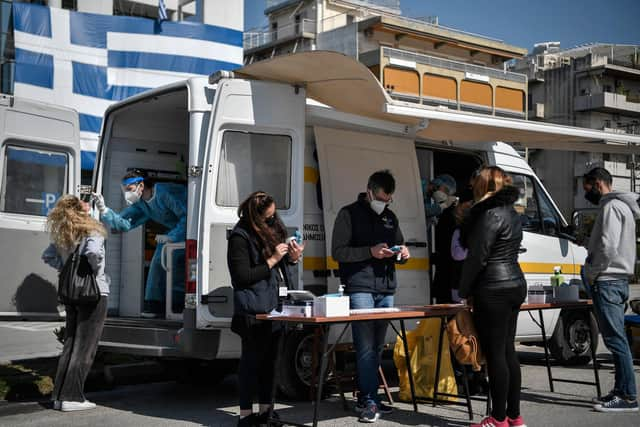Covid overseas: ‘People just don’t go to get tested, they can’t afford it’
Non-emergency medical care has been halted and the country has introduced strict new lockdown measures, including a nightly curfew of 9pm and limited movement for those who are not vaccinated.
The official tally of cases in Romania reached more than 18,000 a day this week, around the same level as the UK, when population sizes are taken into account – however with low vaccination rates of around just 30 per cent of adults, deaths are at the highest level in the world, at 121.7 million Covid deaths per million people. Britain, by comparison, is currently registering just 11.4 Covid deaths per million. Experts know the true number of Covid cases in Romania is far higher.
Advertisement
Hide AdAdvertisement
Hide Ad“There is huge under reporting of cases – we definitely have far more cases than the official numbers,” says Mădălina Coman, associate professor of the Department of Public Health at Babeş-Bolyai University in Cluj.


The number of daily cases in the UK has also risen dramatically in the past few weeks to over 50,000 a day – a level not seen since April. Scottish cases have dropped since the peak of around 7,000 cases a day in early September, but have recently plateaued, prompting the Scottish Government to opt to keep mitigation measures in schools, such as masks.
However, the number of tests carried out in the UK per head is far higher than in many other countries. According to data from US university Johns Hopkins, Britain tests more per head of population than most other nations, at 1,395 tests per 100,000 people in the last seven days alone. In comparison, the figure for the US tested just 367 people per 100,000 of population in the past week. In other countries, like Mexico, the figure is far lower, at just nine per 100,000 people.
While in Scotland and the rest of the UK, anyone with symptoms can take a free PCR test, either at a test centre or through the post, not every country has such readily available – of affordable - testing. Meanwhile, in Britain, lateral flow tests are widespread and free of charge, meaning many asymptomatic cases are picked up, which may otherwise have gone unchecked.
In Romania, however, a PCR test is around 35 euros, with some clinics charging up to 70 euros. If a patient is very unwell, they can call a special ambulance dedicated to Covid, which tests the person at home, however, this can be a lengthy process.


"People just don’t go to get tested, they often can’t afford it – especially the PCR test,” says Prof Coman. “Someone might get the antigen (lateral flow) test from the pharmacy and test by themselves, but those are not reported anywhere, so they do not go into the official figures.”
She adds: “The other option is that people with symptoms just do nothing, which I see a lot of people doing now. Hence our high death rates in Romania due to Covid and the fact that we have no empty beds in the ER and all ‘non-urgent’ surgical procedures are suspended.”
Lateral flow testing, which has been a large part of the UK’s Covid monitoring for some time, is equally not freely available in many places. Free rapid tests are available in the UK, with the Scottish Government encouraging everyone to take a test at home twice a week. Some workplaces have testing requirements, while high schools also encourage pupils to take twice weekly tests.
Advertisement
Hide AdAdvertisement
Hide AdThe UK Government said this week around a third of UK Covid cases are being picked up through lateral flow testing – and then confirmed with a PCR. While lateral flow tests are not considered to be as accurate as PCR tests, they can often pick up a Covid infection when the person is at their most infectious and most likely to spread the virus.
Linda Bauld, professor of public health at the University of Edinburgh, says it is impossible to compare Covid case rates between countries due to different testing regimes.
"I think trying to compare cases between countries is very misleading,” she says. “I don't think they're a reliable indicator at all. More reliable indicators are how many people are in hospital with Covid-19 in different countries. I think that's more comparable.”
Even across Europe, the picture differs hugely by country, with some countries charging people for tests, even if they have symptoms. In Germany, PCR tests for people with symptoms remain free, however the government recently scrapped free lateral flow tests, which are essential for anyone who is unvaccinated to enter venues such as restaurants.
Ms Bauld echoes Prof Coman’s fears that for many people, a fee could be a deterrent, or in some cases, a financial barrier, to testing.
She says: "I think that clearly having to pay for testing puts people off, you saw that with our PCR requirement for travel [to Scotland]. It is a big disincentive for people to bother at all to do it. And I think that means that in countries where you do have to pay for a test, it's going to discourage people from taking it. Our public health point is that if you charge people to be tested, they will not come forward.”
In Greece, testing was free up until the summer, now, PCR tests cost five euros - yet testing levels remain high, at 1,751 per 100,000 for the last seven days.
Project manager Annamaria Roman, who lives in Athens, does not believe in Greece, however, the charge for a test puts many people off.
Advertisement
Hide AdAdvertisement
Hide Ad"It’s five euros, as much as a coffee, nobody says they can’t afford it,” she says. “Here, the population is also very old, so in order to protect them, people really do get tested or vaccinated. Everyone has been super serious about it and people are really careful. If you have a runny nose, you call in sick [to work].”
In Greece, workers have to be vaccinated – or regularly prove a negative Covid test, a pricey decision for anyone uncertain about taking the vaccine. There are free rapid testing vans in cities, where people can get a lateral flow test if they do not have symptoms – however they are not given any documentation relating to the result, to ensure that unvaccinated people who need a negative test to enter a venue or go to work are forced to pay for one.
"I use them if I am visiting my boyfriend’s grandfather, who is unable to get the vaccine,” explains Ms Roman.
Even In Vietnam, where the average salary is less than £200 a month, a PCR test is around £25, while a lateral flow test has a health insurance excess charge of around £3. Mass state-funded testing targeted at an area with an outbreak, such as last month, when authorities aimed to test all of the capital, Hanoi’s, eight million population, is free.
In neighbouring Thailand, where cases have been fairly low until recently, anyone who tested positive, even if asymptomatic, was admitted to hospital for quarantine. Rapid tests, which are available at pharmacies for a small fee for those who can afford them, have only just been made widely available.
Teacher Kate McLeod, who lives in Bangkok with her husband and two young children, says the quarantine policy – combined with a charge, depending on the type of test – deterred people from being tested.
She says: “For a while, people didn’t want to get tested, as you couldn’t do it yourself and if you were found positive at a hospital or testing place you would immediately be admitted to hospital - the place that tested you being responsible for your care. It’s now much easier to test yourself.”
Prof Bauld believes while UK figures now may look high compared to other countries, the full impact of the pandemic is still to play out.
Advertisement
Hide AdAdvertisement
Hide Ad"I think the key metric that will be used to compare countries is excess mortality,” she says. “And I think in the fullness of time, we may not look as bad internationally as we did in 2020.
“History will look back and say, ‘the countries that had robust testing regimes did better’. I think the UK will be amongst that – not in the first stages of the pandemic, but later on.”
A message from the Editor:
Thank you for reading this article. We're more reliant on your support than ever as the shift in consumer habits brought about by Coronavirus impacts our advertisers.
If you haven't already, please consider supporting our trusted, fact-checked journalism by taking out a digital subscription.
Comments
Want to join the conversation? Please or to comment on this article.
